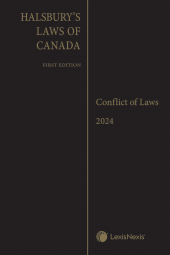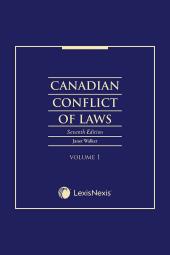Common Law, Civil Law and the Future of Categories
One Year Subscription Only Terms
Subscribers receive the product(s) listed on the Order Form and any Updates made available during the annual subscription period. Shipping and handling fees are not included in the annual price.
Subscribers are advised of the number of Updates that were made to the particular publication the prior year. The number of Updates may vary due to developments in the law and other publishing issues, but subscribers may use this as a rough estimate of future shipments. Subscribers may call Customer Support at 800-833-9844 for additional information.
Subscribers may cancel this subscription by: calling Customer Support at 800-833-9844; emailing customer.support@lexisnexis.com; or returning the invoice marked 'CANCEL'.
If subscribers cancel within 30 days after the product is ordered or received and return the product at their expense, then they will receive a full credit of the price for the annual subscription.
If subscribers cancel between 31 and 60 days after the invoice date and return the product at their expense, then they will receive a 5/6th credit of the price for the annual subscription. No credit will be given for cancellations more than 60 days after the invoice date. To receive any credit, subscriber must return all product(s) shipped during the year at their expense within the applicable cancellation period listed above.
Product description
Do the Categories Have a Future?
Around the world, there are signs that the traditional categories of civil and common law may be collapsing in the wake of procedural reform spurred by a new range of concerns and aspirations for procedure. In the United Kingdom, the reviews being conducted 10 years after the Woolf Reforms and in Canada, civil procedure rules in British Columbia, Ontario, and the Federal Court are all undergoing major reforms. Reforms in Europe and the United States are also challenging the traditional categories.
These changes give rise to a host of questions, such as:
- Will the age-old categories of common law and civil law continue to be relevant?
- What new categories have emerged?
- How do changes affect the roles of parties, judges, counsel, and witnesses?
- What procedural developments have proven to be effective - regardless of categories?
- How will disputes be resolved in the future?
Common Law, Civil Law and the Future of Categories presents the first comprehensive and structured study of the divide between civil and common law. The essays in this collection were originally presented at the 2009 International Association of Procedural Law conference in Toronto. Each essay tackles a topic significant for litigators and other procedural lawyers in a bijural country, underscoring the important impact this has on Canadian law.
Features and Benefits
- Authors, including leading scholars, academics, and authorities on international law from 35 countries, for a truly global perspective
- Introductory essays for each part of the book, taking a comparative approach to the topic
- In-depth examination of controversial issues that blur the line between categories, including:
- How common law integrates case management reforms to resemble the judge-led procedure in the civil law
- How the increased use of oral hearings in civil law creates similarities to the common law
Essential Reading For
- Canadian and international academics with an interest in conflict of laws, civil procedure, and international and comparative law
- Common law litigators and other procedural lawyers seeking to keep in touch with recent and upcoming developments
- Canadian international law practitioners who require a comprehensive resource on changes in the common law/civil law distinction
Table of contents
Preface
Introduction
I - Rethinking the Common Law/Civil Law Divide -- Contributors: Mirjan Damaŝka, Marcel Storme & Oscar G. Chase
II - Country Studies from Across the Divide -- Contributors: Janet Walker, Linda S. Mullenix, Andres de la Oliva Santos, Samuel P. Baumgartner, Neil H. Andrews, Yasuhei Taniguchi & Murat Ozsunay
III - Changing Roles of the Participants -- Contributors: Garry D. Watson, Trevor C. W. Farrow, Emmanuel Jeuland, David Bamford, The Hon. Justice Ian Binnie, Judith Resnik, Eduardo Oteiza, Soraya Amrani-Mekki & Baosheng Zhang
IV - International Harmonization Projects -- Contributors: Valerie Oosterveld, Eva Storskrubb, Rolf Strner, His Excellency Fausto Pocar
V - Country Studies From Beyond the Divide -- Contributors: Thomas O. Main, Ada Pellegrini Grinover, Kazuo Watanabe, Celia Fassberg, The Hon. Allan Lutfy, Emily McCarthy, Dmitry Maleshin, Pamela Jane Schwikkard, Alan Uzelac, Margaret Woo & Yanmin Cai
VI - Convergence in Other Contexts -- Contributors: Sean Rehaag, Erik S. Knutsen, Burt Neuborne, Richard Marcus, Peter Murray, Edward F. Sherman & Dirdre Dwyer
VII - Cultural Dimensions of Harmonization -- Contributors: Peter Gottwald, H. Patrick Glenn & Michaele Taruffo
VIII - Looking Ahead: The Future of Categories - Categories of the Future -- Contributors: Janet Walker, Loc Cadiet & Geoffrey C. Hazard
 Lexis Nexis
Lexis Nexis 


